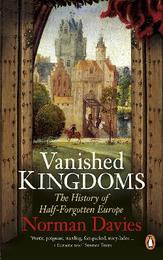
|
Vanished Kingdoms: The History of Half-Forgotten Europe
Paperback / softback
Main Details
| Title |
Vanished Kingdoms: The History of Half-Forgotten Europe
|
| Authors and Contributors |
By (author) Norman Davies
|
| Physical Properties |
| Format:Paperback / softback | | Pages:848 | | Dimensions(mm): Height 197,Width 130 |
|
| ISBN/Barcode |
9780141048864
|
| Classifications | Dewey:940 |
|---|
| Audience | |
|---|
|
Publishing Details |
| Publisher |
Penguin Books Ltd
|
| Imprint |
Penguin Books Ltd
|
| Publication Date |
4 October 2012 |
| Publication Country |
United Kingdom
|
Description
A magical and acclaimed history, bringing back to life the lost realms of Europe, now in trade paperback We habitually think of the European past as the history of countries which exist today but Europe's history is littered with kingdoms, duchies, empires and republics which have now disappeared but which were once fixtures on the map of their age - 'the Empire of Aragon' which once dominated the western Mediterranean; the Grand Duchy of Lithuania, for a time the largest country in Europe; the successive kingdoms (and one duchy) of Burgundy, much of whose history is now half-remembered - or half-forgotten - at best. How many British people know that Glasgow was founded by the Welsh in a period when neither England nor Scotland existed? How many of us will remember the former Soviet Union in a few generations' time? Will our own United Kingdom become a distant memory too? As in his earlier celebrated books Europe- a History and The Isles, Norman Davies aims to subvert our established view of what seems familiar, and urges us to look and think again.
Author Biography
Norman Davies is the author of the No 1 best-seller Europe: a History (1996), Microcosm: Portrait of a European City (with Roger Moorhouse) and Rising '44: the Battle for Warsaw (date). From 1997-2006 he was Supernumerary Fellow of Wolfson College, Oxford; he is now Professor at the Jagiellonian University at Cracow, an Honorary Fellow of St Antony's College, Oxford and a life member of Clare Hall and Peterhouse, Cambridge. He is a Fellow of the British Academy, and lives in Oxford and Cracow.
Reviews"An alternative history of Europe that is . . . densely packed yet commendably accessible, magisterial, and uncommonly humane."--"The Boston Globe" "Hugely ambitious . . . From the mists, Mr. Davies summons the kingdoms; he records their emergence, their flowering and their demise--whether by 'internall diseases' or 'forraign warre' in Thomas Hobbes's words. And he examines the traces that the kingdoms have left behind, in works of art or a piece of rock or perhaps just a place name."--"The Wall Street Journal" "Davies is certainly one of the best British historical writers of the past half century, and every gauntlet he throws down is bejeweled. His literary gifts and his capacity for what he nicely calls 'imaginative sympathy' are stretched to their limits by this challenging project. . . . Yet Davies succeeds, and it is quite a success." --Timothy Snyder, "The Guardian" (London) "Davies is certainly one of the best British historical writers of the past half century, and every gauntlet he throws down is bejeweled. His literary gifts and his capacity for what he nicely calls 'imaginative sympathy' are stretched to their limits by this challenging project. . . . Yet Davies succeeds, and it is quite a success." --Timothy Snyder, "The Guardian" "Davies is well known as an iconoclast who punctures the comforting myths of countries that history has blessed. . . . "Vanished Kingdoms" gives full rein to his historical imagination and enthusiasms, imparting a powerful sense of places lost in time. All across Europe ghosts will bless him for telling their long-forgotten stories." --"The Economist" "Davies resurrects the lands and peoples that were lost in the brutal tide of history. . . . It takes a tremendous feat of empathy to write about countries and peoples that no longer exist. And the amount of information in "Vanished Kingdoms" that will be new to all but the most expert students of European history is staggering. . . . Fascinating facts and insights flutter on its many pages."--"San Francisco Chronicle" "An alternative history of Europe that is . . . densely packed yet commendably accessible, magisterial and uncommonly humane."--"The Boston Globe"
|